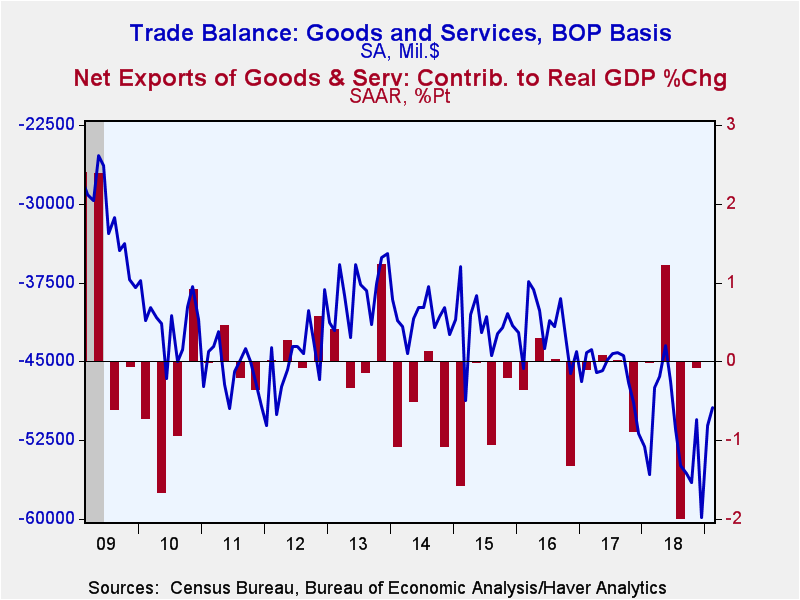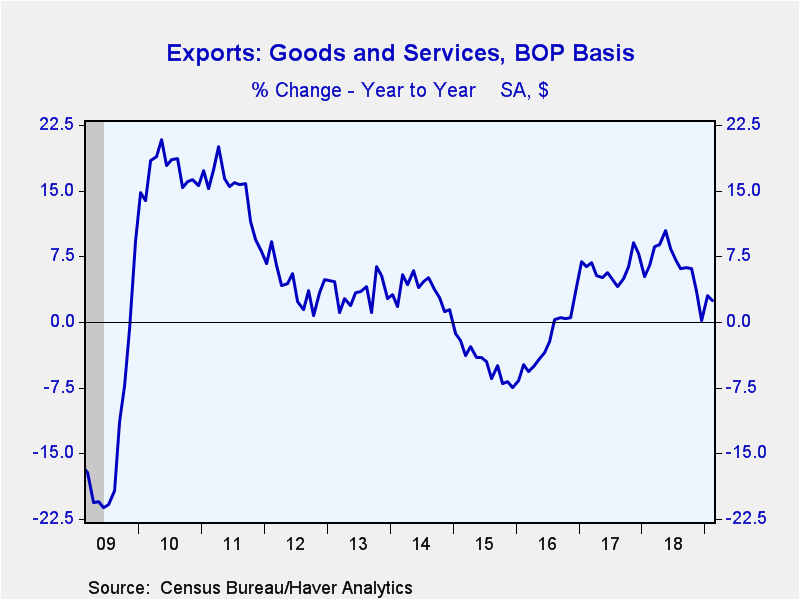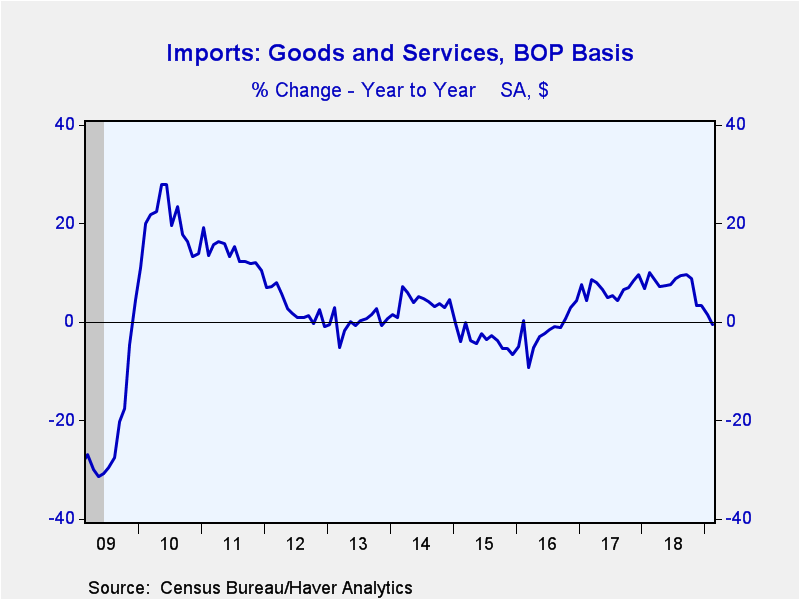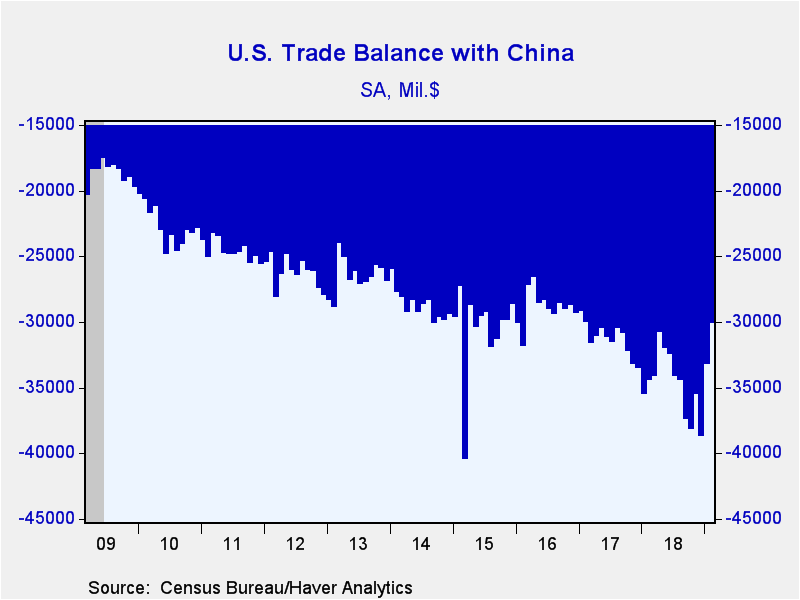 Global| Apr 17 2019
Global| Apr 17 2019U.S. Trade Deficit Shrinks as Exports Strengthen
by:Tom Moeller
|in:Economy in Brief
Summary
The U.S. trade deficit in goods and services declined to $49.38 billion during February. It was the narrowest shortfall since June of last year and compared to December's record of $59.90 billion. A deficit of $53.8 billion had been [...]
The U.S. trade deficit in goods and services declined to $49.38 billion during February. It was the narrowest shortfall since June of last year and compared to December's record of $59.90 billion. A deficit of $53.8 billion had been expected in the Action Economics Forecast Survey. The deficit narrowed as exports increased 1.1% (2.4% y/y) and imports rose 0.2% (-0.5% y/y).
The strength in exports was fueled by a 1.5% rise (2.6% y/y) in goods exports. A 4.6% advance (5.1% y/y) in capital goods exports accompanied a 4.3% rise (-2.4% y/y) in auto exports. Nonauto consumer goods exports improved 0.2% (6.8% y/y). Working 2.3% lower (+3.9% y/y) were exports of foods, feeds & beverages. Exports of industrial supplies & materials eased 0.9% (+0.2 y/y), the fourth consecutive monthly drop.
Imports of goods nudged 0.4% higher (-1.0% y/y). Holding back the increase was a 2.7% decline (-9.8% y/y) in imports of industrial supplies. Imports of foods, feeds & beverages dropped 1.6% (-4.0% y/y) and automotive imports were fairly stable (2.6% y/y). Nonauto consumer goods imports rose 2.8% (1.9% y/y) and capital goods imports gained 0.3% (-0.7% y/y).
Petroleum imports increased 4.9% (-18.4% y/y) in February. The value of nonpetroleum imports edged 0.1% higher (0.6% y/y). The price of crude oil imports rose 10.1% (-14.1% y/y) to $46.89 per barrel.
Services exports improved 0.3% (2.0% y/y) as transport exports rose 2.1% (0.1% y/y) and travel exports rose 0.1% (0.9% y/y). Charges for the use of intellectual property were fairly steady (-4.0% y/y) for the fourth consecutive month.
Imports of services fell 0.6% (+1.4% y/y). The value of transport imports declined 2.5% (+5.5% y/y) and travel imports were off 0.9% (+6.0% y/y). Charges for the use of intellectual property eased 0.1% (-15.1% y/y).
The trade deficit with China fell sharply to $30.12 billion (SA), its narrowest in two years. Exports fell 13.9% y/y while imports dropped 12.8% y/y. The trade deficit with Japan deepened significantly to $6.67 billion as exports rose 2.7% y/y and imports increased 5.5% y/y. The trade deficit with the European Union narrowed to $12.41 billion due to a 14.1% y/y rise in exports and a 1.6% y/y increase in imports.
The international trade data as well as oil prices can be found in Haver's USECON database. Detailed figures on international trade are available in the USINT database. The expectations figures are from the Action Economics Forecast Survey, which is carried in AS1REPNA.
| Foreign Trade in Goods & Services (Current $) | Feb | Jan | Dec | Feb Y/Y | 2018 | 2017 | 2016 |
|---|---|---|---|---|---|---|---|
| U.S. Trade Deficit ($ bil.) | 49.38 | 51.13 | 59.90 | 55.72 (2/18) |
622.11 | 552.28 | 502.00 |
| Exports of Goods & Services (% Chg) | 1.1 | 1.0 | -1.9 | 2.4 | 6.4 | 6.1 | -2.2 |
| Imports of Goods & Services (% Chg) | 0.2 | -2.6 | 2.1 | -0.5 | 7.6 | 6.8 | -1.7 |
| Petroleum (% Chg) | 4.9 | -6.2 | -8.7 | -18.4 | 21.0 | 27.2 | -19.5 |
| Nonpetroleum Goods (% Chg) | 0.1 | -2.8 | 3.4 | 0.6 | 7.5 | 5.6 | -1.2 |
Tom Moeller
AuthorMore in Author Profile »Prior to joining Haver Analytics in 2000, Mr. Moeller worked as the Economist at Chancellor Capital Management from 1985 to 1999. There, he developed comprehensive economic forecasts and interpreted economic data for equity and fixed income portfolio managers. Also at Chancellor, Mr. Moeller worked as an equity analyst and was responsible for researching and rating companies in the economically sensitive automobile and housing industries for investment in Chancellor’s equity portfolio. Prior to joining Chancellor, Mr. Moeller was an Economist at Citibank from 1979 to 1984. He also analyzed pricing behavior in the metals industry for the Council on Wage and Price Stability in Washington, D.C. In 1999, Mr. Moeller received the award for most accurate forecast from the Forecasters' Club of New York. From 1990 to 1992 he was President of the New York Association for Business Economists. Mr. Moeller earned an M.B.A. in Finance from Fordham University, where he graduated in 1987. He holds a Bachelor of Arts in Economics from George Washington University.
More Economy in Brief
 Global| Feb 05 2026
Global| Feb 05 2026Charts of the Week: Balanced Policy, Resilient Data and AI Narratives
by:Andrew Cates










